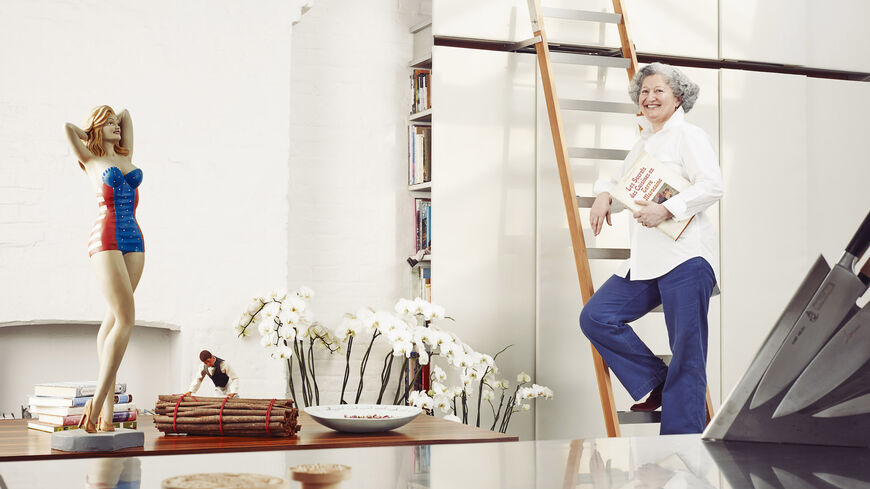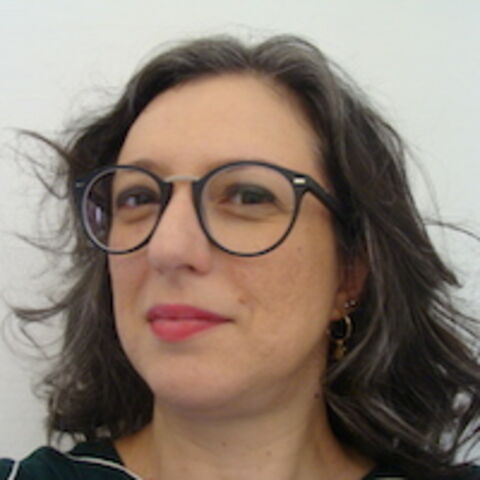Anissa Helou made a career as a food writer and cookery teacher after quitting a job in the art world.
Beirut-born and for many years resident in London, she has managed the difficult task of being one of the few Levantine chefs to have visibility in the West.
Helou is the daughter of a Syrian civil engineer and contractor, who died when she was 30, and a Lebanese mother, today aged 91. She left Lebanon in 1973, at the age of 21, to resettle in London. She quit design school after a few months, but after a one-year course at Sotheby’s auction house, she became one of the very few female art consultants of the time.
She worked in the art world for 20 years, first at Sotheby’s and later as an independent consultant.
She entered the food world by sheer coincidence, driven more by her love for writing than a passion for cooking. In the early 1990s, her intention was to write a book about collecting when she hired a literary agent.
Helou’s agent also happened to have a publisher who was looking for an author to write a book on Lebanese food. The result appeared in 1994, under the title Lebanese Cuisine, and was immediately short-listed for the prestigious André Simon award in England.
Expanding the reach of Levantine cuisine
While occasionally giving cooking classes, along with culinary tours of Turkey and the Levant, she also helped food entrepreneurs to establish their businesses in London.
Helou recounts that at the beginning of her career as a cookery writer, she chose “a few mentors” that she met thanks to her literary agents and friends. These were people from the food world that very often became friends themselves.
The ability of food to root identity in the land while crossing borders is a feature of all of her books.
She specialized in cooking and writing recipes for Mediterranean, Levantine and North African cuisines.
In a recent book about food of the Islamic World, she describes the recipe for chapatis, probably the most common bread of South Asia that is made everywhere: at home, on the streets and in restaurants. Helou explains that the same recipe exists in the neighboring regions — shaped primarily by trade — of Zanzibar and the Arabian Gulf. But “there they just cook the bread on a hot plate.”
Countries across the Mediterranean share a similar food experience. In the book Helou wrote about this sea’s rich tradition of street food, recipes are rooted in the same ingredients, from hummus in Tel Aviv to kebab in Athens, but with the addition of regional variations.
Her first book Lebanese Cuisine has become a cornerstone of Middle Eastern gastronomic literature. She also wrote Feast: Food of the Islamic World (2018), Levant: Recipes and memories from the Middle East (2013), and Mediterranean Street Food (2002), among many others.
Helou's articles have appeared in publications such as the Financial Times, and she has made occasional appearances on TV food shows.
Women-focused mission
Helou is often described as a feminist because of the way she has lived her life. She said she takes her own decisions without depending on anyone — “especially not men” — and being fiercely independent.
She also works with women whenever she can. Helen Saberi, the author of Afghan Cookery; Zelfa Hourani, the niece of renowned British-Lebanese historian Albert Hourani; her first literary agent Caroline Davidson; friend Zaha Hadid, the late renowned Iraqi-British architect; these are just a few names of the women that make Helou’s official biography.
In the beginning of her career as an art consultant for the Middle East, she was introduced to the daughters of Sheikha Badriyah al-Sabah, one of the first — if not the first — businesswomen in Kuwait. They immediately connected, and she became both a friend and a consultant to the Royal family.
All along her life, Helou has always found good reasons to go further her mission.
Years ago, she bought a piece of land in Erice, not far from the city of Trapani, on the southern Italian island of Sicily. After she witnessed the olive harvest on a friend's land, she decided to move to the Mediterranean island.
She is hoping to restore the ruin on her land into a cooking school this year, and to open the school after her new book on regional Lebanese cooking is published in 2025, she told Al-Monitor. “Despite Lebanon being very small,” she says, “it has distinctive regional dishes.”
Next year, she will celebrate her 30th anniversary as a published food writer. A few months ago, she started writing a newsletter on Substack, titled "Anissa’s." “My agent in NYC suggested it as another platform to spread the word about my work but also to earn money as not all my posts are free," she said. "I could also write a little about the research for my new book ahead of its publication.”







